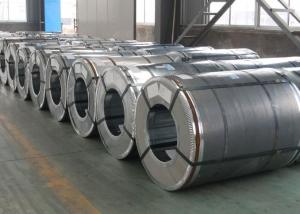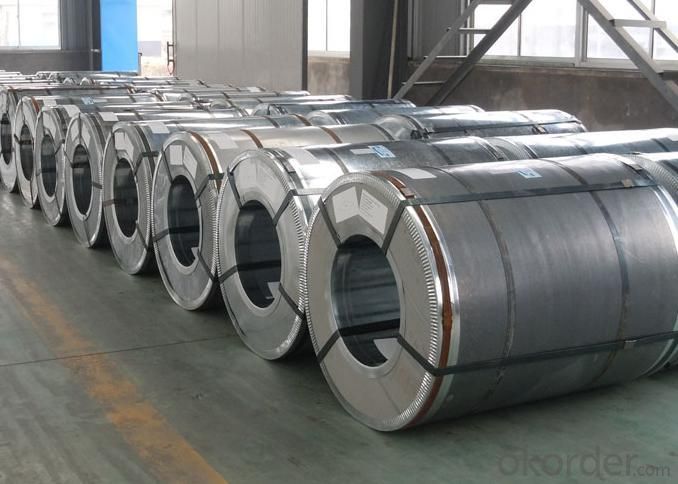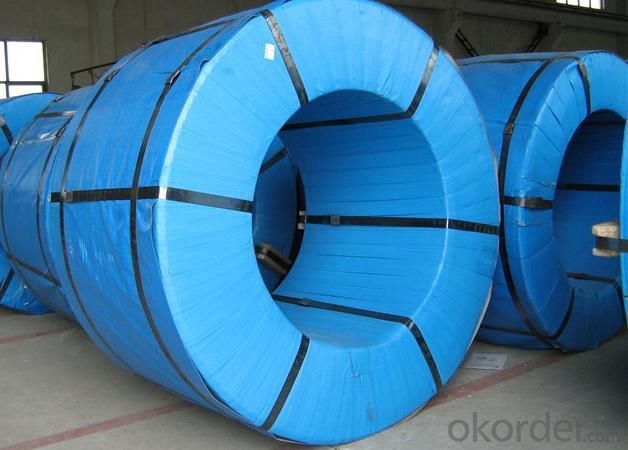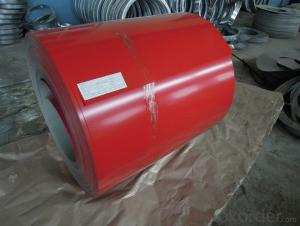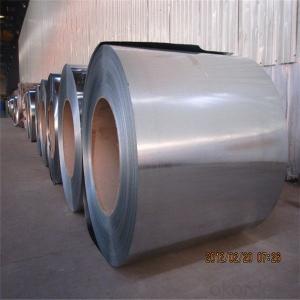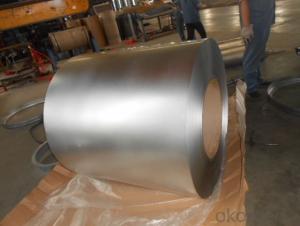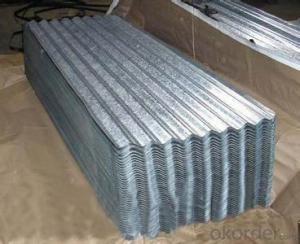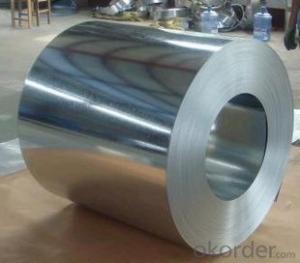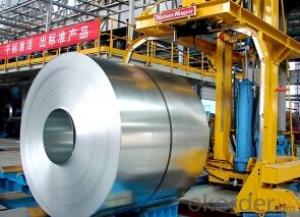Alu Zinc Steel Coil
- Loading Port:
- China Main Port
- Payment Terms:
- T/T or L/C
- Min Order Qty:
- 25mt m.t.
- Supply Capability:
- 5000mt/per month m.t./month
OKorder Service Pledge
OKorder Financial Service
You Might Also Like
General Information Of Galvalume Steel Coil AZ150
With Cold Rolled Steel as base metal,with the aluzinc coated, finally the plate steel is called galvalume steel. Galvalume steel is good capable of decoration, molding, corrosion resistance. It generally displays superior workability, durability and weather resistance.
Thickness 0.23-1.2mm (BMT) |
Zinc Coating 80-275g/m2 |
Color According to RAL color fan |
Internal Diameter 508mm or 610mm |
Coil Weight 4-8MT |
Quality Commercial and structural quality |
Paint Polyester paint for topside, epoxy for reverse |
Standard JIS G 3312, ASTM A755M, EN 10169 |
Base Steel Grade SGCC,SGCD,DX51D+Z,DX52D+Z;S200GD,S220GD, S280GD,S350GD,CS,FS,SS |
Chemical Composition Of Aluzinc Steel
C | Si | Mn | P |
0.04-0.06% | 0.01-0.03% | 0.18-0.22% | 0.014-0.016% |
Technical Data Of Prepainted Galvanized Steel
Yield Strength | (Mpa) 280-320 |
Tensile Strength | (Mpa) 340-390 |
Elongation | 20%-30% |
Reverse Impact | 9J |
T-bending | ≥2T |
Pencil Hardness | ≥2H |
Duration Of Salt Spray Test | 500 H |
Bending At 180 Degree | No crack, purling and fraction |
Application Of Aluzinc Steel
Outdoor:
roof, roof structure, surface sheet of balcony,
frame of window, door, door of garage, roller shutter door, booth, Persian blinds, cabana, etc.
In door:
door, isolater, frame of door, light steel structure of house, home electronic appliances, etc.
Packaging & Delivery Of Aluzinc Steel
Anti-damp paper inside full wrapped with plastic film, iron sheet outside on wooden pallet in 20 feet container with 25mt.
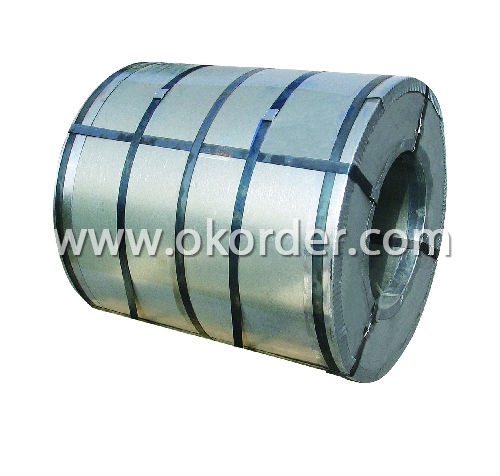
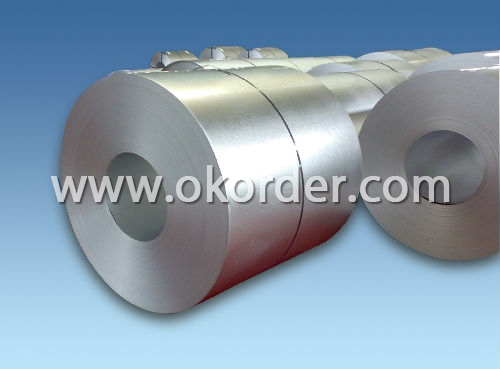
- Q: Want to construct a patio cover approx. 20 feet long. Only want to use a 6x6 or 8x8 post at each end. What size steel i-beam would I have to use to carry the load???
- First of all is it a rule of thumb with carpenters and ironworkers never to set steel on wood. I would use a 14 tall (2) ply lvl header. *Laminated veneer Lumber. This will hold the weight of the structure between your posts. A steel beam would be quite costly today as prices on steel have skyrocketed, plus you would need a boom truck or small crane to set this beam, and you would need some sort of mounting bracket or holes pre-drilled in the beam ends to secure it to the posts. Plus you would need to have the beam delivered and if your patio is in the backyard - you would need another pc.of equipment to get it around back. Advice from me is to go with an LVL beam. They are 1+3/4 Thick and you would need a (2 ply ) beam, which means you set one pc. and then laminate another one into the first. Glue between layers (use heavy duty liquid nails) and then Lag screw them together. Use 5/16 x 3 lag screws with a washer on each one. Pre-drill holes about 3/16 smaller than lag screws - then insert lag screws and tighten up with an electric impact.
- Q: What is the typical lead time for ordering steel coils?
- The typical lead time for ordering steel coils can vary depending on factors such as the supplier, quantity required, and current market conditions. However, it is common for lead times to range from a few weeks to several months.
- Q: How are steel coils used in the production of industrial storage tanks?
- Industrial storage tanks commonly utilize steel coils due to their superior strength and durability. These coils are typically crafted from high-quality steel that is rolled into a coil shape, enabling convenient transportation and handling. During the production process, steel coils are initially uncoiled and flattened to create steel sheets. These sheets are then cut and formed into the desired shape and size for the storage tank. The steel sheets are joined together through welding or bolting to construct the tank's body, which is designed to endure high pressure and heavy loads. The utilization of steel coils in the production of industrial storage tanks offers numerous benefits. Firstly, the strength and durability of steel ensure that the tanks can withstand harsh conditions and resist corrosion. This is particularly vital for storage tanks containing corrosive substances or exposed to severe environments. Moreover, the flexibility of steel coils permits customization of the tank's design and size. This is especially advantageous in industries with varying storage requirements, like the oil and gas sector. Steel coils can be effortlessly cut and molded into diverse shapes and sizes, facilitating the creation of storage tanks tailored to specific storage needs. Furthermore, steel coils are easily transportable and storable, making them a cost-effective choice for industrial storage tank production. The coils can be efficiently transported to the manufacturing facility, reducing transportation costs and logistical complexities. In conclusion, steel coils play a crucial role in the production of industrial storage tanks by providing strength, durability, and customization options. Their usage guarantees the safe storage and protection of various substances, rendering them indispensable in a wide range of industries.
- Q: I'm doing a commercial for chemistry and I need to know any kind of chemistry dealing with Callaway Big Bertha Irons. I know they are stainless steel but any more info would help out! Thank you! :)
- Stainless steel is a mixture of metals, each metal is included in order to make up for each others weaknesses. Each metal is included due to a property that is benificial in some way, for instance Chromium is included because it makes the stainless steel 'stainless'. In chemistry a mixture of metals, stainless steel, is called an alloy.
- Q: Why are properties of steel not identical?
- Grade 440C is one of the highest strength stainless steels. It is also very wear resistant. Good for use as ball bearings and other high wear applications. 400C has the highest carbon content of the 440 steels. 440A and 440B are identical but have lower carbon contents and have lower strengths and higher corrosion.
- Q: How are steel coils processed for different levels of hardness?
- Steel coils can be processed to achieve different levels of hardness through a variety of methods. One common method is heat treatment, which involves heating the coils to a specific temperature and then rapidly cooling them to alter their microstructure and achieve the desired hardness. The process of heat treatment can include quenching, tempering, or annealing, depending on the desired hardness level. Quenching involves cooling the coils rapidly in a liquid medium such as water or oil to achieve a high hardness level. Tempering, on the other hand, involves reheating the coils to a lower temperature and then slowly cooling them to achieve a desired balance of hardness and toughness. Annealing is a process that involves heating the coils to a specific temperature and then slowly cooling them to relieve internal stresses and achieve a softer and more ductile material. Additionally, mechanical processes such as cold rolling or cold working can also be used to increase the hardness of steel coils. These processes involve subjecting the coils to compressive forces, which cause the material to deform and result in an increase in hardness. Overall, the processing of steel coils for different levels of hardness requires careful control of temperature, cooling rate, and mechanical forces to achieve the desired properties for specific applications.
- Q: I have a knife with AUS8 Stainless Steel. No idea what that means. I want to know some of the best stainless steels for knifes and all you can tell me about stainless steel would be great. I was browsing google and looking at grades and had no idea what all the numbers meant. Thanks!
- Actually-good grades of stainless is superior to high carbon steels which has been proven by countless tests. Aus8 is a japanese steel from what I know, so I'm not sure what the letter and number designation means. From what I know, Aus8 has similar properties to 440B though with a carbon content of around ~.74%. This is lower content then most other blade steels meaning it has lower edge retention. The stainless steels I'd consider to be best are: Ats-34: Less corrosion resistant then 440c, but is tougher then 440c and still holds a edge quite well 440c: Probably the best all around steel on the market for its price. Highest corrosion resistance and very good edge retention. I wouldn't recommend it on choppers though, a tougher steel like the one mentioned above would probably be better for that. A/B/C indicates the carbon content going from least to greatest. 4xx indicates that its a chrome martensitic steel. 40 indicates that its a high carbon grade compared to (4)20 which has less then .5 percent. CpmS30v: Slightly lower corrosion resistance then 440c due to it not taking a mirror finish, but very high edge retention and improved toughness. Cpm indicates that it's made by compressed particle metallurgy while the v indicates that its a vanadium alloy. I'm not sure what the S30 indicates.
- Q: How are steel coils used in the production of electrical transmission towers?
- Steel coils are used in the production of electrical transmission towers as they are shaped and welded to create the structural framework of the towers. The coils are unrolled, cut, and formed into the required shape, providing strength and stability to support power lines and equipment.
- Q: I wanted to know what is steel fabricating?
- Steel Fabricating/or Steel Fabricators is just a fancy way of saying that they sell steel products and a variety of related services. Thomas steel products has a wide range of steel products and services, from Windsor Republic Door Dist, Tie Wire, Steel Doors Frames, Snap Ties, S Parker Hardware Distributor, Reinforcing Steel Detail Drawings Avail, Rebar Fabrication, o_O.
- Q: How are steel coils used in the production of appliances?
- Steel coils are used in the production of appliances as a primary material for constructing the various components, such as the outer shells, frames, and internal structures. The coils are processed and shaped into specific sizes and forms to meet the requirements of different appliances. Additionally, steel coils provide strength, durability, and a sleek appearance to the finished appliances.
1. Manufacturer Overview
| Location | Jiangsu, China |
| Year Established | 2003 |
| Annual Output Value | US$1 Million - US$2.5 Million |
| Main Markets | Southern Asia; America; South America; Eastern Europe |
| Company Certifications | ISO 9000 ISO 14000 OHSAS 18000 |
2. Manufacturer Certificates
| a) Certification Name | |
| Range | |
| Reference | |
| Validity Period |
3. Manufacturer Capability
| a) Trade Capacity | |
| Nearest Port | Shanghai |
| Export Percentage | 1% - 10% |
| No.of Employees in Trade Department | 100 People |
| Language Spoken: | English; Chinese |
| b) Factory Information | |
| Factory Size: | Above 200,000 square meters |
| No. of Production Lines | 14 |
| Contract Manufacturing | Design Service Offered |
| Product Price Range | Average |
Send your message to us
Alu Zinc Steel Coil
- Loading Port:
- China Main Port
- Payment Terms:
- T/T or L/C
- Min Order Qty:
- 25mt m.t.
- Supply Capability:
- 5000mt/per month m.t./month
OKorder Service Pledge
OKorder Financial Service
Similar products
Hot products
Hot Searches
Related keywords
